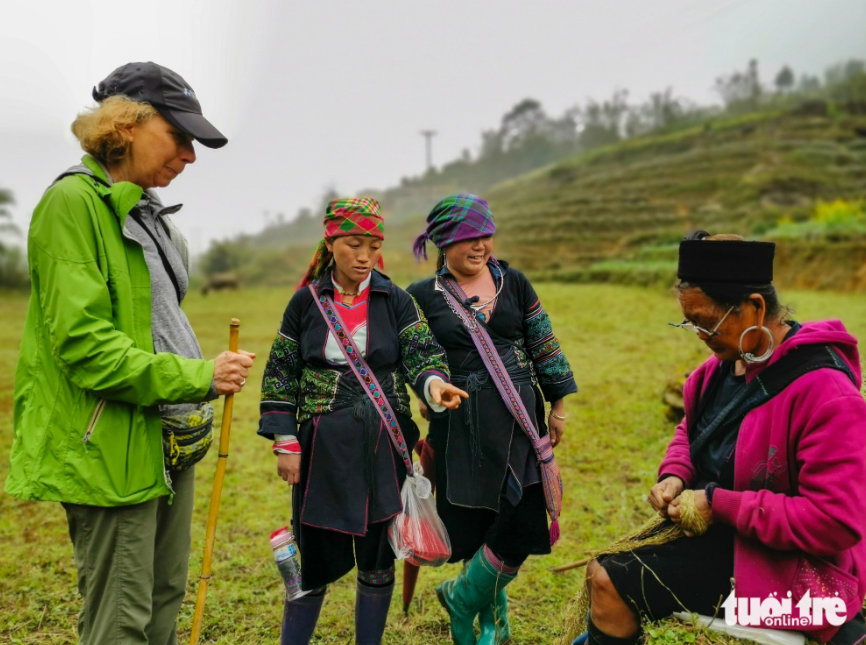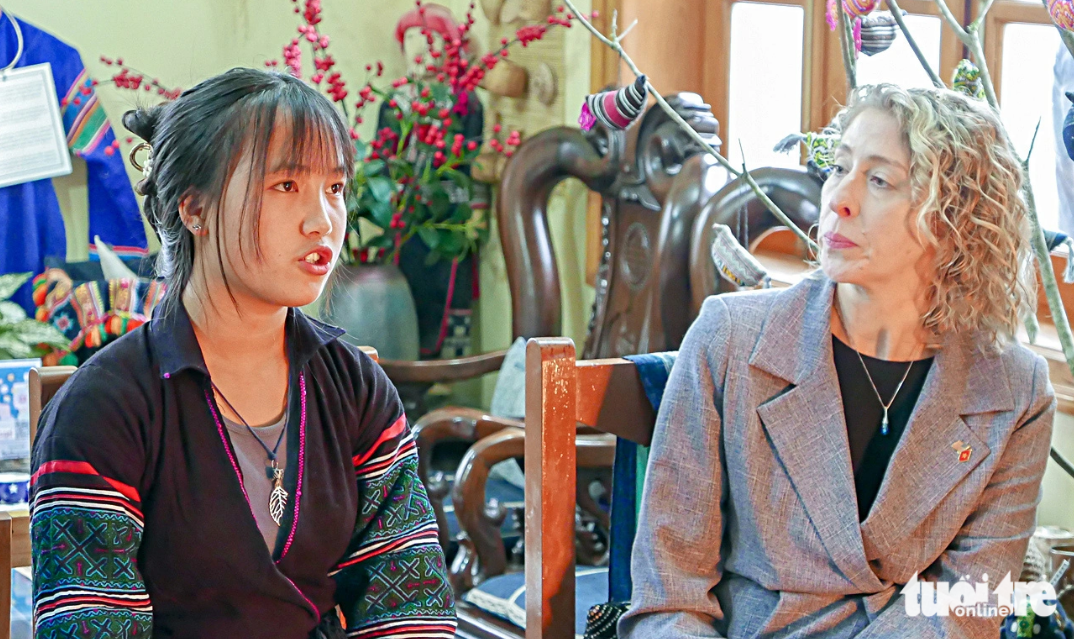They don’t know how to read or write Vietnamese, as they haven’t attended school.
Both of them have been working as tour guides in Sa Pa, a popular tourist destination in northern Vietnam, for more than a decade. They leave tourists amazed by their ability to speak English.
Ly Thi Co, who lives in Sa Xeng Mountain Village in Trung Chai Commune under Sa Pa Town, communicates with tourists in English while speaking the Mong ethnic minority language at home.
Her Vietnamese-speaking ability is limited.
|
|
| Ly Thi Co introduces the traditional knitting craft to foreign visitors. Photo: Vu Tuan / Tuoi Tre |
A Remarkable Tour Guide
Once, Co took a taxi to pick up two Swedish tourists to Sa Xeng Village. After arriving, they walked through a beautiful valley covered with rapeseed flowers.
During their three-hour trek, Co shared numerous stories about the daily activities of the Mong people, such as farming, terraced rice fields, crops, and the traditional craft of weaving practiced by Mong women.
She also introduced her father, who is a shaman, and her mother, who is skilled in using traditional medicinal herbs to treat the sick, to the two foreigners.
The tourists were captivated by her stories about the magnificent Hoang Lien Son mountain range.
The young Mong woman, with 15 years of experience, told these stories in English.
When she was a child, she worked as a street vendor in Sa Pa Town to support her family. She would walk around the town selling brocade handbags, wallets, and keychains.
She started learning English after observing other vendors using the language to attract foreign customers. These vendors would also receive tips from tourists for providing guidance.
At the age of 10, Co began learning English by approaching visitors in front of hotels to promote her products and communicate with them.
Foreigners often stayed in Sa Pa Town for a week or even a month, enjoying activities such as hiking, climbing, and visiting mountain villages for sightseeing.
Some tourists would spend the entire day with Co, asking numerous questions about the life of the Mong people.
At the age of 14, Co moved to Sa Pa Town to settle there.
Thanks to her fluency in English, she was hired by hoteliers as a tour guide for foreign visitors.
She would take them around the town and provide them with camping, trekking, and climbing experiences.
On her first day of work, she earned VND70,000 (US$2.85), a significant increase from the hundreds of Vietnamese dong she used to earn as a street vendor.
|
|
| Ly Thi Cha speaks English fluently during her talks with foreign tourists. Photo: Vu Tuan / Tuoi Tre |
Pursuing Education for Poverty Reduction
Like Co, many girls in Lao Chai Mountain Village have become tour guides.
The village has become a popular destination for international travelers, leading to the establishment of homestays and hotels.
Several years ago, the village was impoverished, and most children had to work year-round.
In the past, only families with farms and buffaloes could afford to send their children, mostly boys, to school. Meanwhile, girls stayed home taking care of their younger siblings, herded buffaloes, worked in terraced rice fields, and got married.
Thao Thi Tra, a grandmother of six, got married at a young age and has four children of her own.
After becoming a tour guide, her family’s financial situation improved, and her children were able to attend school.
She also opened a homestay to serve tourists and increase her income.
“I always wanted to go to school, but my family was poor and the school was far from my house,” Tra recalled.
She learned English while selling goods at the Sa Pa markets and interacting with foreigners.
Gradually, she became fluent in English.
“At first, I thought I could use English to sell more products. However, I preferred working as a tour guide to share stories about my ethnic community with my guests,” she said.
Ly Thi Cha, a local in Lao Chai Mountain Village, passed a college entrance exam to study tourism after facing months of despair and hopelessness.
Her father is addicted to alcohol and drugs.
Meanwhile, her mother left for China to escape her father’s violent beatings.
Cha has had no contact with her mother since then.
Her father abandoned her and her two older sisters to be with another woman, leaving the girls to live in poverty.
Cha made a living as a street vendor and considered dropping out of school.
Fortunately, she was adopted and able to continue her education.
She studied English and became fluent in the language.
During high school, she participated in various projects organized by international organizations.
Another proficient English speaker from an ethnic minority background is Thao Thi Tra, aged 45.
She can only write her name in Vietnamese and cannot read Vietnamese or English.











